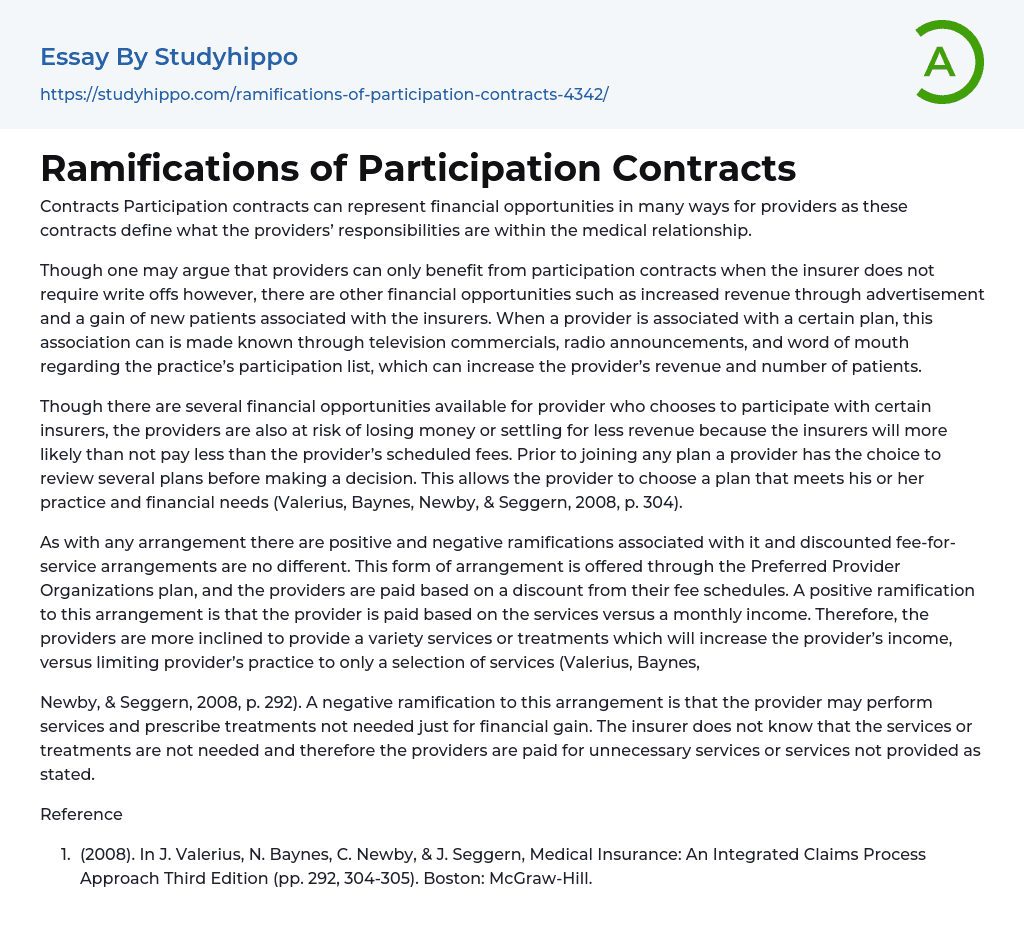Contracts Participation contracts can represent financial opportunities in many ways for providers as these contracts define what the providers’ responsibilities are within the medical relationship.
Though one may argue that providers can only benefit from participation contracts when the insurer does not require write offs however, there are other financial opportunities such as increased revenue through advertisement and a gain of new patients associated with the insurers. When a provider is associated with a certain plan, this association can is made known through television commercials, radio announcements, and word of mouth regarding the practice’s participation list, which can increase the provider’s revenue and number of patients.
Though there are several financial opportunities available for provider who chooses to participate with certain insurers, the providers are also at risk of losing money or se
...ttling for less revenue because the insurers will more likely than not pay less than the provider’s scheduled fees. Prior to joining any plan a provider has the choice to review several plans before making a decision. This allows the provider to choose a plan that meets his or her practice and financial needs (Valerius, Baynes, Newby, & Seggern, 2008, p. 304).
As with any arrangement there are positive and negative ramifications associated with it and discounted fee-for-service arrangements are no different. This form of arrangement is offered through the Preferred Provider Organizations plan, and the providers are paid based on a discount from their fee schedules. A positive ramification to this arrangement is that the provider is paid based on the services versus a monthly income. Therefore, the providers are more inclined to provide a variety services or treatments which will increase the provider’s income,
versus limiting provider’s practice to only a selection of services (Valerius, Baynes,
Newby, & Seggern, 2008, p. 292). A negative ramification to this arrangement is that the provider may perform services and prescribe treatments not needed just for financial gain. The insurer does not know that the services or treatments are not needed and therefore the providers are paid for unnecessary services or services not provided as stated.
Reference
- (2008). In J. Valerius, N. Baynes, C. Newby, & J. Seggern, Medical Insurance: An Integrated Claims Process Approach Third Edition (pp. 292, 304-305). Boston: McGraw-Hill.
- Cloning essays
- Medical Ethics essays
- Patient essays
- Therapy essays
- drugs essays
- Cannabis essays
- Aspirin essays
- Cardiology essays
- Hemoglobin essays
- Pharmacology essays
- Surgery essays
- alternative medicine essays
- Plastic Surgery essays
- Organ Donation essays
- Vaccines essays
- Medical essays
- Dentist essays
- Psychological Trauma essays
- Physical therapy essays
- Cold essays
- Cocaine essays
- Why Marijuana Should Be Legalized essays
- Drug Abuse essays
- Teenage Drug Abuse essays
- Heart Disease essays
- Artery essays
- Agreement essays
- Business Law essays
- Common Law essays
- Community Policing essays
- Constitution essays
- Consumer Protection essays
- Contract essays
- Contract Law essays
- Copyright Infringement essays
- Court essays
- Crime essays
- Criminal Law essays
- Employment Law essays
- Family Law essays
- Injustice essays
- Judge essays
- Jury essays
- Justice essays
- Lawsuit essays
- Lawyer essays
- Marijuana Legalization essays
- Ownership essays
- Police essays
- Property essays




